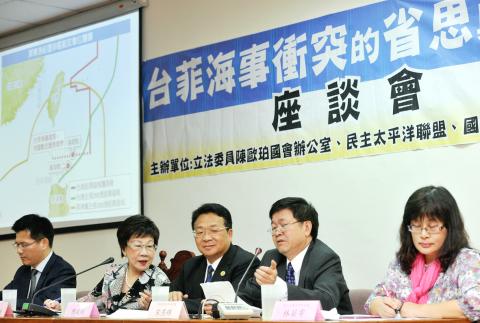Washington’s mediation is likely needed to resolve the diplomatic row between Taiwan and the Philippines over the death of a Taiwanese fisherman, an academic told a symposium yesterday.
“As bilateral tensions remain strong and communication appears to have stalled, US intermediation could be the best way to bring an end to the diplomatic row,” said David Huang (黃偉峰), a researcher at Academia Sinica and a former deputy representative to the US.
Huang was speaking at a symposium organized by former vice president Annette Lu (呂秀蓮) to examine Taipei and Manila’s handling of the controversy over the death of fisherman Hung Shih-cheng (洪石城), who was shot dead by Philippine Coast Guard personnel on May 9.

Photo: Chien Jung-fong, Taipei Times
Although both sides are still negotiating over a parallel investigation, Huang said the fact-finding phase was over and neither side would trust each other’s finding, which is why a public hearing hosted by a third party, preferably the US, could be helpful in clearing up the case.
Like other participants in the symposium, Huang said Taipei had performed poorly in the diplomatic war with Manila, which had a complete set of scenario planning after defining the shooting incident as an unfortunate accident from the first moment and has never given up that position.
In contrast, President Ma Ying-jeou’s (馬英九) administration has been slow to present the evidence it had obtained in the investigation and in responding to Manila’s strategy, he said.
Huang also expressed strong opposition to Taiwan’s recent military exercise in the two nations’ overlapping exclusive economic zones in the Bashi Channel, because it could be interpreted as a move threatening regional stability and turn Taiwan’s role as a victim into a perpetrator.
Taiwan’s failure to publicize the information it had obtained in the case to the international community was apparent, as was its inconsistent positions to the Philippines’ response toward its 72-hour ultimatum and the subsequent sanctions, Lu said.
She also singled out Representative to the US King Pu-tsung (金溥聰) for failing to garner support in Washington, which appears to have favored Manila in the case.
DPP Legislator Lin Chia-lung (林佳龍) said Ma had handled the diplomatic affair so poorly that “his crisis management has become a crisis itself.”
However, the diplomatic row could be a blessing in disguise in the long run, Lu said, as it was a reminder for Taiwan, an island country, that a comprehensive policy on maritime affairs, especially in relation to the East China Sea and the South China Sea, was imperative.
The former vice president urged Ma to organize a national conference to review and map out a comprehensive maritime policy.
Song Yann-huei (宋燕輝), a research fellow at the Institute of European and American Studies at Academia Sinica, echoed Lu’s appeal, saying that the conflict provides Taiwan a window of opportunity to establish its maritime strategy because, in the long run, it would have to deal with ASEAN countries, such as Vietnam, on the South China Sea issue.

Taiwanese scientists have engineered plants that can capture about 50 percent more carbon dioxide and produce more than twice as many seeds as unmodified plants, a breakthrough they hope could one day help mitigate global warming and grow more food staples such as rice. If applied to major food crops, the new system could cut carbon emissions and raise yields “without additional equipment or labor costs,” Academia Sinica researcher and lead author the study Lu Kuan-jen (呂冠箴) said. Academia Sinica president James Liao (廖俊智) said that as humans emit 9.6 billion tonnes of carbon dioxide compared with the 220 billion tonnes absorbed

The Taipei Mass Rapid Transit (MRT) Wanda-Zhonghe Line is 81.7 percent complete, with public opening targeted for the end of 2027, New Taipei City Mayor Hou You-yi (侯友宜) said today. Surrounding roads are to be open to the public by the end of next year, Hou said during an inspection of construction progress. The 9.5km line, featuring nine underground stations and one depot, is expected to connect Chiang Kai-shek Memorial Hall Station to Chukuang Station in New Taipei City’s Jhonghe District (中和). All 18 tunnels for the line are complete, while the main structures of the stations and depot are mostly finished, he

Taipei is to implement widespread road closures around Taipei 101 on Friday to make way for large crowds during the Double Ten National Day celebration, the Taipei Department of Transportation said. A four-minute fireworks display is to be launched from the skyscraper, along with a performance by 500 drones flying in formation above the nearby Nanshan A21 site, starting at 10pm. Vehicle restrictions would occur in phases, they said. From 5pm to 9pm, inner lanes of Songshou Road between Taipei City Hall and Taipei 101 are to be closed, with only the outer lanes remaining open. Between 9pm and 9:40pm, the section is

China’s plan to deploy a new hypersonic ballistic missile at a Chinese People’s Liberation Army Rocket Force (PLARF) base near Taiwan likely targets US airbases and ships in the western Pacific, but it would also present new threats to Taiwan, defense experts said. The New York Times — citing a US Department of Defense report from last year on China’s military power — on Monday reported in an article titled “The missiles threatening Taiwan” that China has stockpiled 3,500 missiles, 1.5 times more than four years earlier. Although it is unclear how many of those missiles were targeting Taiwan, the newspaper reported